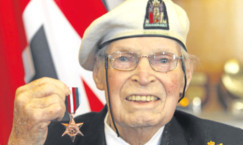
“It was cold, about minus 30, and when the sea splashed on to the deck it froze instantly. One man on our ship froze to death on watch.
Picture the scene.
“In my two convoys, we never had a calm sea it was always violent. The warship I was on was considered expendable and the merchant ships we were protecting in the convoy travelled so slowly they were sitting ducks.”
Imagine yourself there.
“If you didn’t shift the ice the ship was in danger of overturning. We had to try to chip it off with hammers and scrapers anything you could lay your hands on. You daren’t touch any metal rail on deck as your hand would stick to it.”
Try to visualise this.
“Sometimes you wanted the terrible cold and the weather because it kept the U-boats down below and the aircraft couldn’t fly. In the summer there was almost 24-hour daylight that was when you were most vulnerable to attack.”
The word “hero” is used very lightly these days. But the Arctic convoy veterans have always been the real deal.
And finally, last week, 67 years after their epic 1,600-mile trips with food and weapons to Archangel and Murmansk, that heroism was recognised with the award of Arctic Star medal.
About time.
Of the 66,000 Royal Navy sailors and merchant seamen who made the hazardous trip from the Highlands to transport the supplies that kept Russia in the war, 3,000 didn’t return. But even though the Arctic “suicide mission” let the Red Army occupy the Nazis on the Eastern front and fatally weakened Hitler’s war effort, the men were cold-shouldered by the decorations committee in 1945.
The Soviet Union was suddenly the enemy and Britain’s military top brass were embarrassed by the convoy’s indirect role in Stalin’s rise to power.
Veterans were told they could apply for the Atlantic Star medal but that required a six-month minimum service and many merchant seamen failed to qualify.
When the Berlin Wall fell, the campaign for formal recognition began in earnest. Former defence secretary John Reid offered the Arctic Emblem, but veterans dismissed it as a mere badge. In opposition David Cameron promised a medal but in office suggested the campaign was now too long past.
Ironically, Russia may have helped break the log jam when they offered our Arctic heroes their Ushakov Medal last year. Unbelievably the British Government blocked the offer but the ensuing furore prompted expert scrutiny of the convoy case and finally the Arctic Star medals were struck.
Convoy campaigner, 93-year-old Commander Eddie Grenfell, said: “God knows how many of my Arctic Convoy chums have died waiting. All because we were waiting for politicians who have never heard a shot in their lives to make up their minds.”
The wait has been nothing short of scandalous and has tainted the new medal for many Arctic heroes.
But I hope the 39 veterans who travelled north to Loch Ewe last week know one thing. Never mind governments the gratitude and admiration of the British people is engraved on every medal. Wives, friends, sons, daughters and grandchildren spent the week remembering, retelling and reliving the incredible deeds of their Arctic heroes. Now we all know what real heroism means. And we can share the particular pain of Jock Dempster’s family. Tragically the veteran’s leader from Dunbar died just days before the Loch Ewe ceremony.
But another thing is certain, for admiring Scots, Russians and merchant seamen the world over his Arctic Star will never fade.

Enjoy the convenience of having The Sunday Post delivered as a digital ePaper straight to your smartphone, tablet or computer.
Subscribe for only £5.49 a month and enjoy all the benefits of the printed paper as a digital replica.
Subscribe